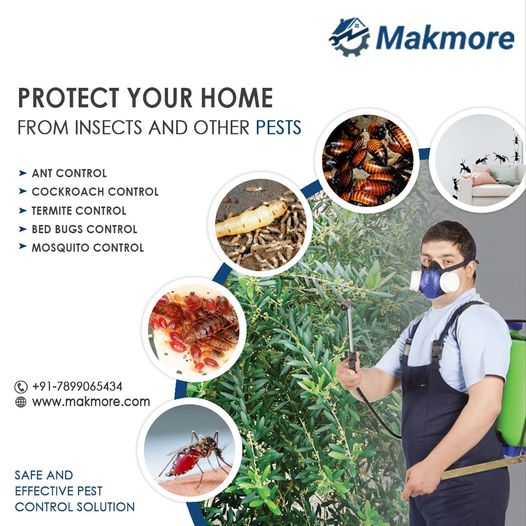Comprehensive Pest Control Auckland Solutions: Safeguard Your Space Today
Comprehensive Pest Control Auckland Solutions: Safeguard Your Space Today
Blog Article
Recognizing Different Types of Bug Control Approaches and Their Effectiveness
When thinking about pest control techniques, it is important to understand the varied approaches offered and their varying levels of effectiveness. By checking out the subtleties of these insect control strategies, a thorough understanding of exactly how to resolve pest issues can be developed.
Chemical Parasite Control Approaches
Chemical insect control techniques play an essential function in effectively managing and getting rid of pest infestations in various environments. One of the essential advantages of chemical insect control is its capability to offer quick and targeted remedies to pest troubles. Pest Control Auckland.
Nonetheless, it is important to consider the possible threats and downsides connected with chemical insect control techniques. Overreliance on chemicals can bring about the growth of pesticide resistance in bugs, making them more difficult to regulate in the lengthy run. Furthermore, making use of specific chemicals can have hazardous effects on non-target microorganisms, the atmosphere, and human health if not used properly.

Biological Bug Control Techniques
Utilizing all-natural predators and microorganisms to manage pest populaces successfully, organic insect control approaches use a lasting and environment-friendly method to pest management. By advertising the task or presenting of microorganisms that naturally exploit or infect bugs, such as ladybugs for aphid control or specific bacteria for caterpillar infestations, organic control can help preserve bug populations at manageable degrees without the need for synthetic chemicals. This method is particularly advantageous for chemical-free farming methods, as it stays clear of the usage of potentially hazardous compounds while maintaining crop wellness.

Physical Parasite Control Approaches
While organic bug control approaches concentrate on using all-natural predators and pathogens, physical parasite control approaches make use of physical and mechanical barriers to manage insect populations. These methods are commonly thought about eco-friendly as they decrease the usage of chemicals. Physical pest control consists of strategies such as capturing, using obstacles like webs or displays, and physically eliminating bugs from the area.
Catches are frequently utilized in physical parasite control to capture and get rid of insects like insects and rodents. These catches can be baited with food or pheromones to bring in the insects, leading them to an included location where they can be easily gotten rid of. An additional physical method is the usage of barriers such as screens, fences, or webs to stop parasites from getting in or infesting certain areas. For instance, setting up fine mesh displays on home windows can help stay out flies and insects.
All-natural Pest Control Methods
Integrating plant-based repellents and natural predators is a crucial approach in executing effective natural pest control techniques. By encouraging the presence of helpful bugs like ladybugs, lacewings, or aggressive termites, gardeners can naturally control pest populations. These killers feed upon common garden pests such as caterpillars, mites, and aphids, assisting to maintain a well balanced community without the need for chemical treatments.

Additionally, implementing social practices such as plant turning, friend planting, and keeping proper plant wellness can also enhance the effectiveness of all-natural pest control approaches. These techniques not just help in avoiding pest invasions yet likewise advertise biodiversity and total community resilience. By incorporating these all-natural methods, people can successfully manage bugs while decreasing environmental effect.
Integrated Bug Administration (IPM) Approach
Executing an Integrated Bug Administration (IPM) strategy is crucial for efficiently controlling visit this web-site parasite populations news while reducing dependence on chemical pesticides. IPM is a sustainable and comprehensive approach that combines various insect control techniques to attain lasting services. This method concentrates on avoidance, surveillance, and control to deal with insect concerns in an environmentally pleasant manner.
IPM integrates biological, cultural, physical, and mechanical methods with the minimal and critical use chemicals when essential. By stressing aggressive actions such as environment alteration, organic control, and exemption, IPM intends to minimize insect populaces and their influence on the ecosystem. Regular surveillance is essential in IPM to evaluate insect levels accurately and determine one of the most appropriate control techniques.
One of the vital benefits of IPM is its capability to minimize the risks related to too much pesticide use, such as ecological contamination and injury to non-target microorganisms. Furthermore, IPM promotes an extra alternative method to pest management by considering the total environment dynamics. Overall, the IPM technique offers a sustainable and reliable service for parasite control while advertising ecological duty.
Final Thought
In verdict, understanding the different types of parasite control methods and their effectiveness is vital in effectively managing insect invasions. Integrated Parasite Monitoring (IPM) strategy, which combines various approaches for lasting parasite control, is increasingly being recognized as a eco pleasant and all natural solution.
Chemical parasite control approaches play a crucial duty in properly taking care of and getting rid of pest problems in numerous atmospheres.Using natural predators and virus to check my blog take care of bug populations efficiently, biological parasite control approaches use a sustainable and environment-friendly technique to pest management. By introducing or advertising the task of organisms that naturally prey on or infect bugs, such as ladybugs for aphid control or specific bacteria for caterpillar problems, biological control can help maintain pest populaces at workable degrees without the requirement for synthetic chemicals.While organic parasite control techniques concentrate on utilizing natural killers and microorganisms, physical pest control approaches utilize mechanical and physical obstacles to handle pest populaces. Integrated Pest Monitoring (IPM) method, which integrates different methods for lasting pest control, is significantly being recognized as a ecologically pleasant and holistic solution.
Report this page